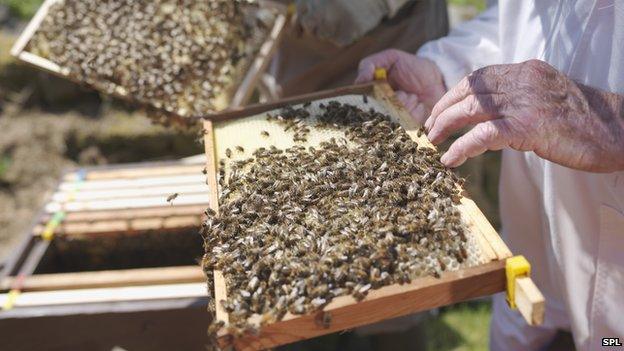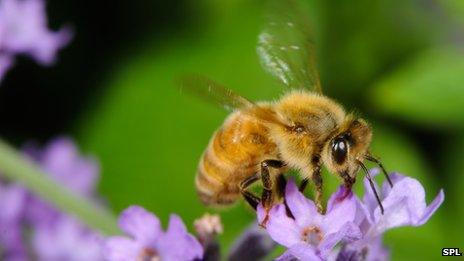Honey bee losses double in a year due to poor winter
- Published

Following on from a disappointing summer, the cold winter has been very difficult for bees
This winter's losses of honey bee colonies were the worst since records began six years ago, according to a survey carried out by the British Beekeepers Association.
It says more than a third of hives did not survive the cold, wet conditions.
All regions of England saw dramatic declines with the numbers lost more than double the previous 12 months.
This year's poor winter, following on from a disastrous summer, is said to be the main reason for the losses.
British beekeepers have been surveyed at the end of March for the last six years.
They are asked to compare the number of colonies that are still alive compared to the numbers they had back in October.
With overall losses at 33.8%, this year's figures are the worst yet recorded.
The hardest hit region was the South West where over half of the hives were lost.
"It is desperate; it is a huge loss of bees," Devon beekeeper Glyn Davies told BBC News.
"The weather last summer and this winter, the two combined meant there was virtually a whole year when bees were confined and stressed just because of the environmental conditions."
Queens affected
The bad weather meant that honey bees were unable to get out and forage. There was a scarcity of pollen and nectar throughout the season.
Some beekeepers believe that the increased number of infections and disease that bees are subject to may have made them weaker and unable to cope with the colder conditions.
"We are in a different era; quite frankly the bees haven't got the resistance and reserves that they once did because of various illnesses and viruses," said Mr Davies, who himself lost around a quarter of his 25 colonies.

Finding pollen and nectar has been extremely difficult for bees
The weather also posed problems for newly emerged queen bees - "virgin queens". The growth of colonies depends on these bees being able to mate properly so they can lay fertilised eggs. But the poor weather hampered these activities as well.
If the weather is changeable, a queen may not execute her mating flight properly, Tim Lovett from the British Beekeepers Association told BBC News.
"If she doesn't get properly mated she can only lay drones, and if she is doing that, that's the death knell for the hive."
A colony that has only drones and no workers will not survive.
Another weather-related factor that has worked against the bees is what is called isolation starvation. Because of the cold, the bees cluster very closely together to maintain hive temperature and consume the stores of honey closest to them.
If the weather is so cold that they can't actually move, the bees will starve - although there may be plenty of food sources nearby.
Beekeepers say that is very bad news for honey supplies in the coming months. Late last year, the British Beekeepers' Association reported that the honey crop, external was down by over 70% compared to 2011. They do not have great hopes for a recovery this year.
"It's disastrous for honey production," said Mr Lovett. "There is a cumulative effect because you have got to replace those hives. That is something the beekeeper now has to do.
"This loss of bees was in effect far more dramatic than foot-and-mouth was on the national beef herd. It means a great deal of work ahead for beekeepers to get back to where they were."
Follow Matt on Twitter, external.
- Published25 May 2013
- Published26 May 2013
- Published29 April 2013